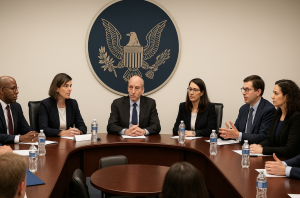
SEC’s DeFi Roundtable Could Shape the Future of Crypto Regulation!
-
The SEC’s roundtable on DeFi highlights growing interest in regulating decentralized finance, especially smart contracts and governance.
-
Projects need to review their whitepapers and governance setups to stay compliant.
-
Clear, honest communication through whitepapers can help avoid legal trouble and gain trust in this changing landscape.
June 9, 2025, marked a big day for the crypto industry. The U.S. Securities and Exchange Commission (SEC) held a high-profile event in Washington, D.C. called “DeFi and the American Spirit.” This roundtable focused on decentralized finance (DeFi), smart contracts, token governance, and how these new technologies fit into existing financial laws.
It was the fifth roundtable of its kind, but the first to put DeFi front and center. That alone shows the SEC is beginning to take decentralized finance more seriously—and it might be laying the foundation for future regulation.
Why This Event Matters So Much
DeFi isn’t just another crypto trend—it’s a complete overhaul of how finance works. It removes middlemen like banks and replaces them with code, also known as smart contracts, running on blockchains. This technology has been growing fast, but it’s also raised big legal questions.
By holding a full-day event just for DeFi, the SEC signaled a shift. Instead of only cracking down on projects after the fact, it now seems open to open dialogue. That’s a major change—and one that could help founders, developers, and investors understand how to build legally sound DeFi projects from the start.
Smart Contracts in the Spotlight
Smart contracts are the engines that power DeFi. These are bits of code that automatically handle things like lending, staking, and trading without human input. The question regulators are now asking is: Are smart contracts simply tools—or are they investments, and therefore subject to securities laws?
Some speakers at the event argued that smart contracts in decentralized protocols shouldn’t be treated like traditional financial products. But the SEC made its position clear: Automation doesn’t eliminate responsibility. If something goes wrong, someone is still accountable.
Who’s Really in Control?
DeFi is supposed to be decentralized, but that’s not always the case. Many projects are run by small groups of insiders who control token decisions and upgrades. The SEC pointed out that understanding how decisions are made—and who has custody of the tokens—is crucial.
This becomes even more complicated for global projects. Regulators want clarity: Who manages the treasury? How are user funds handled? What happens during disputes? If your whitepaper doesn’t explain these things, your project could face serious questions.
Real-World Assets Are Entering DeFi
The discussion also touched on a growing trend: the tokenization of real-world assets like real estate, art, or stocks. This makes it easier to trade these assets, but also raises regulatory red flags.
If your DeFi platform lets users trade tokenized property, you need to clearly define what ownership means. Does the token give you legal rights? Who enforces them? These are the kinds of details that need to be spelled out in whitepapers and platform terms.
Who Was There?
The event brought together a mix of SEC Commissioners, including Hester Peirce (often called “Crypto Mom” for her pro-innovation stance), Caroline Crenshaw, and Mark Uyeda. Former Commissioner Troy Paredes moderated panels that included developers, legal experts, researchers, and advocates from organizations like Espresso Systems, Jito Labs, and Coin Center.
Importantly, the public could send in questions during the livestream—another sign that the SEC is trying to engage, not just enforce.
What This Means for the Industry
This roundtable follows earlier SEC discussions on crypto custody, stablecoins, and token listings. The focus now seems to be on breaking down the crypto world one topic at a time. And one message was repeated: Whitepapers are now more than technical documents—they’re legal signals.
A clear, detailed crypto whitepaper can help explain how your platform works, how tokens are used, and whether your project is truly decentralized. Think of it as your first line of defense against regulatory scrutiny.
What Should Crypto Projects Do Now?
If you’re a founder or builder, now’s the time to:
- Review your whitepaper to make sure it’s up to date.
- Be transparent about governance, token control, and user protections.
- Work with legal advisors to align your project with evolving regulations.
Projects like Cardano, Chainlink, or even meme coins like Shiba Inu must explain who controls upgrades, how the treasury is managed, and whether there’s a risk of token concentration. These questions are no longer optional—they’re necessary.
The Bigger Picture
Hester Peirce made an important point at the roundtable: innovation should be supported, not stifled. But protecting users matters too. That means crypto whitepapers need to be treated as living documents, constantly updated to reflect how a project operates, how decisions are made, and how users are protected.
In today’s environment, regulation isn’t the enemy—it’s a roadmap. Projects that plan ahead and stay compliant are more likely to succeed in the long run.
Closing Thoughts
The SEC’s DeFi roundtable shows that crypto isn’t just being tolerated—it’s being taken seriously. Regulators want to understand how this new financial system works. That creates an opportunity for crypto founders to build trust, show transparency, and lead the way toward smarter regulation.
